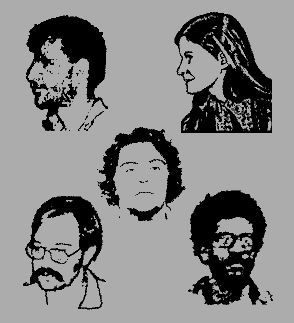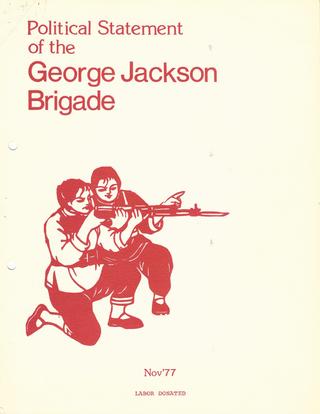George Jackson Brigade Tactical Principles
What Is the George Jackson Brigade?
Description from the George Jackson Brigade Information Project (thanks to archive.org):
The George Jackson Brigade formed in the crucible of prisoners’ rights organizing which came out of the civil rights movement and mass anti-war protests of the ‘60s. In its three-year existence, it claimed 11 bombings, as many bank robberies, and one prisoner liberation. Targets included the Department of Corrections, the Federal Bureau of Investigation and the Bureau of Indian Affairs, as well as different corporate offices. The chemistry present in the group was the same that had been combusting across the country: society’s most oppressed members allied with college educated youth who refused to continue their class and white skin privilege. In the case of the Brigade, women took center stage, queers challenged straights, convicts communicated with college students, and a black man enthusiastically aided whites.
The story of the Brigade takes place against a backdrop of the domestic activism of Black, Chicano, Native American, gay and white prisoners, and armed struggle in the U.S., Canada, Central and South America, Africa, Asia and Europe.
Tactical Lessons
Modern aspiring underground activists can and should learn from those who came before. This is an excerpt from “The Power of the People Is the Force of Life: Political Statement of the George Jackson Brigade”
The main tactical principles we follow are:
#1. We see propaganda and counter-propaganda (important as they are) as secondary aspects of our work. Primarily we strive for our actions to have a material effect on the world.
#2. We concentrate our forces on the enemy’s weaknesses. We choose when, where, and how we will attack; this is our main tactical advantage. Where necessary, we divert the police away from the target.
#3. Overall, we are in a period of defense and consolidation, and we avoid actual confrontation and battle if at all possible. By choosing areas of low police concentration, we try to insure that if we are taken by surprise and have to fight, the outcome will not be in question.
#4. We develop our tactics so as to keep the initiative. That is, to keep the enemy reacting and guessing, never quite sure where we are, who we are, or where we will strike next. In this way we deny them the space to develop an effective plan against us.
#5. The Compton Massacre of the SLA [Symbionese Liberation Army] clearly shows that the police are more than willing to use terror and murder when it suits them. If taken by surprise by a superior force, we will make a positive effort to surrender—we see no advantage to more freedom fighters being fried on the six o’clock news.
#6. On the question of security, consciousness is primary and determines whether or not security will be upheld; specific security measures are secondary. Consciousness, however, develops and comes from the practice of specific measures and techniques. Security is a state of mind. Being security conscious requires that we integrate security into our whole lives; into everything we do. It doesn’t apply just during certain meetings, or with particular people or when the heat is around.
Overall, security practice is common sense. Concrete methods must be different for different circumstances. We think people should develop and apply concrete security practices based on the following principles. We have developed and confirmed these principles in our practice and they have served us well:
(a) Security is very important to our work; it provides the context in which we survive and act. Action, however, is primary. In the end, any contradiction between security and action must be resolved in favor of acting.
(b) No matter who or what the circumstances, don’t tell anyone anything they don’t need to know.
(c) Who to trust: “Trust” no one. “Trust” as a subjective judgment should not enter into security decisions. Assume anyone could be a potential informant unless you’ve had long (years) experience with them, or have thoroughly checked them out. This way no one questionable will see or hear anything they shouldn’t.
(d) When doing secure work with other people, form an organization so you’ll have a vehicle for excluding people and/or thoroughly checking backgrounds when necessary.
(e) Do background checks if you have a reason to question anyone. Be thorough and positive before trusting anyone you don’t have common experience with.
(f) Struggle against paranoia. Paranoia is unreasoning and counterproductive to security. It’s a tool the enemy uses to keep us inactive. Adopt good security practices and develop an all-sided, realistic view of the world.
(g) Assume the enemy knows nothing and that he knows everything he could possibly know. Operating on both these assumptions means that, on the one hand, we will be as careful as possible to deny him access to all sensitive information. We will avoid the laxness that comes from thinking that he must already know such and such so it isn’t worth the trouble to keep it secret. If at the same time we assume he already knows everything he could know, we will avoid being lulled into a false sense of security and will be constantly vigilant.
#7. Good intelligence is the foundation of a successful guerrilla organization. The vast majority of intelligence work involves the gathering and organization of readily available pieces of information. Although this is mostly shit work, there is no way to overstate its importance.
(An important task for people who want to remain aboveground while participating in and supporting armed struggle would be to develop these skills. Start files on developing mass struggle[s]; pay particular attention to the organization of the ruling class as it opposes them; investigate the police and strive to understand their strengths and weaknesses [start by getting a police scanner]; develop target information: suggestions, terrain, weak spots, etc.; talk to the masses about armed struggle; publish the results of these investigations so that underground fighters and everybody else can see them.)
#8. Seattle is our main area of work. There are two reasons for this: First, Seattle is where we have all worked, lived and fought before. It is where we understand best. It is where our roots and our base and our debts are. Second, for as long as we can remain free and fighting where we choose, we attack for all to see the myth of police invincibility.
At the same time, we have to stay vigilant and alert to the progress the police are making in tracking us down, and be prepared to retreat at a moment’s notice to a safer rear area where we can recuperate, lick our wounds, build back our strength and wait for the heat to die down so that we can return again. Our year and a half in Oregon is an example of this. The entire rest of the country is a potential rear area for us. We are trying to develop the ability to make these retreats in a planned way, and on our own initiative.
Learn more about the George Jackson Brigade
Daniel Burton-Rose created a website, and published two books in 2010, available as physical and ebooks:
- George Jackson Brigade Information Project (archive.org)
- Guerrilla USA: The George Jackson Brigade and the Anticapitalist Underground of the 1970s (exploration of the GJB drawing on extensive research and interviews with surviving members)
- Creating a Movement With Teeth: A Documentary History Of The George Jackson Brigade (compilation of contemporaneous documents, including the full text from which we republished the excerpt above)
Consider supporting our work by joining our mailing list below, sharing & "liking" this page, and following us on social media.

